Cracking Eggs and Herding Cattle
June 10, 2019
By Lauren Houska, Iowa Soybean Association
Whether it’s sizzling burgers on the grill at the neighborhood cookout, hearty scrambled eggs on a sunny Sunday morning or a fresh sub sandwich on a family road trip, food sets the stage for summer fun!
The Iowa Food & Family Project’s (Iowa FFP) Food U event explored how those juicy burgers, fluffy eggs and savory sandwiches go from farm to fork on a beautiful Friday in May. Part of an exclusive program for Iowa FFP Champions, 28 Iowans participated in the daylong adventure.
“Food U gives curious consumers the backstage pass to meet farmers, see food production in action and explore the back roads of our incredible state,” says Kelly Visser, consumer engagement manager for the Iowa Soybean Association and Iowa FFP.
Please note, by clicking the links you will be leaving a partially funded checkoff site.
High-tech and Family-owned
The first stop of the tour was at Rose Acre Farms in Guthrie Center.
The company began as a family chicken farm in Indiana in the 1930s and has grown to become the second-largest egg producer in the U.S. and the largest U.S. egg producer that is family-owned. Today, Rose Acre Farms has 17 laying facilities in six states and Iowa locations in Winterset, Stuart and Guthrie Center. The company excels with its commitment to small-town values, quality products and service.
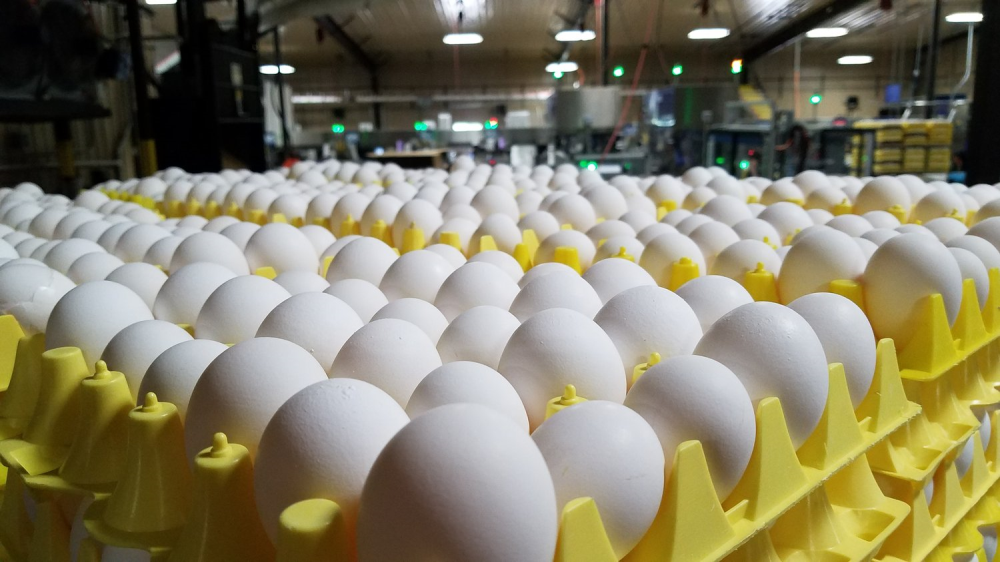
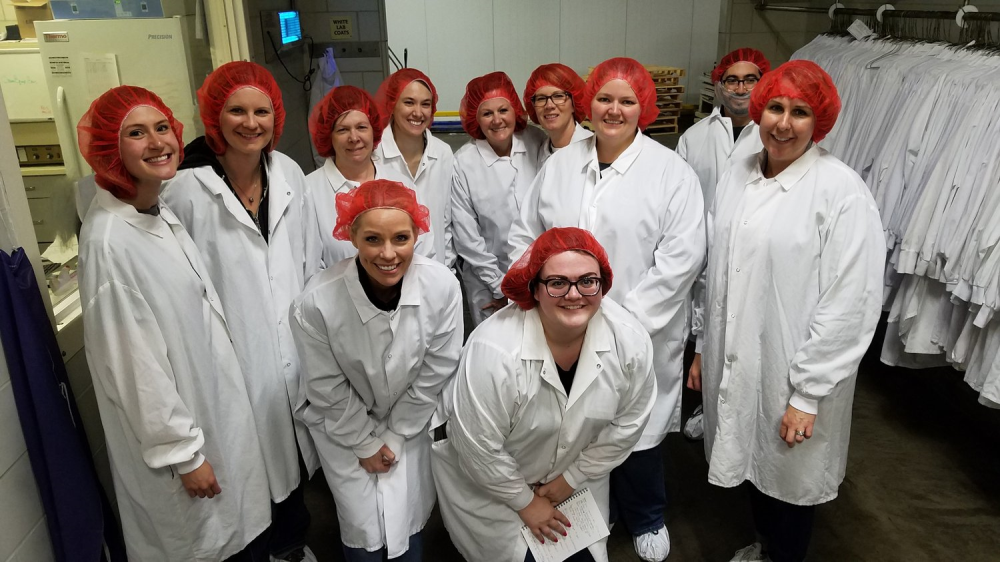
The tour started before participants even stepped off the bus. John Knobbe, complex manager for Rose Acre Farms, hopped on the bus and announced that to ensure food safety and protect the health of their nearly 1.5 million laying hens, the bus would require a sanitation bath before entering the premises.
Biosecurity is a vital component of caring for a healthy flock. Rose Acres Farms is vigilant in setting and maintaining advanced biosecurity protocols, which have significantly increased nationwide since the Avian Influenza outbreak of 2015. In a stroke of good fortune alongside the company’s commitment to biosecurity, the Guthrie Center location was never infected with the disease.
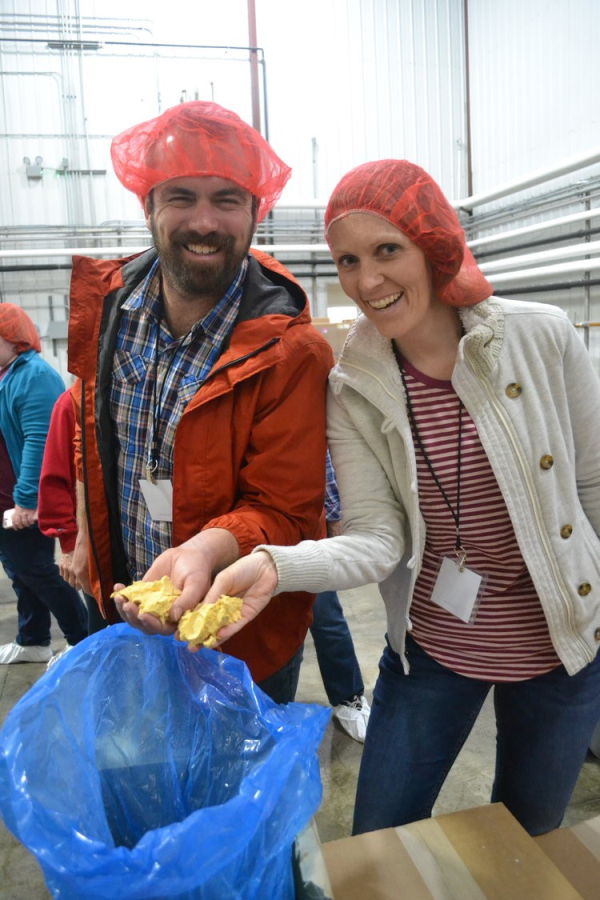 The company ensures safety, consistency and quality by overseeing its supply chain from breeding to laying to processing. Once inside the facility, participants sanitized and covered their shoes and donned hair nets. Led through the processing facility in reverse processing order, participants started in the dryer plant and moved through the egg breaking room and into the egg-washing facility, getting a behind-the-scenes look at the high-tech world of egg processing.
The company ensures safety, consistency and quality by overseeing its supply chain from breeding to laying to processing. Once inside the facility, participants sanitized and covered their shoes and donned hair nets. Led through the processing facility in reverse processing order, participants started in the dryer plant and moved through the egg breaking room and into the egg-washing facility, getting a behind-the-scenes look at the high-tech world of egg processing.
“I loved seeing the process in action at Rose Acre Farms. It was so interesting to get behind the scenes to see how the eggs are cracked and packaged and to hear about the technology used to inspect the eggs — all those little cameras and computers were incredible,” says Julie Kohles, an Iowa FFP Champion and a school social worker from Johnston.
Rose Acre Farms produces a wide range of shell eggs, specialty eggs and egg products. Shell eggs include options from cage-free or conventionally raised hens; and egg products include liquid eggs, dried eggs and egg protein powder. Its wholesale eggs and egg products are sold to businesses in the retail, food service and industrial sectors.
“Agriculture is constantly changing and adapting to keep up with consumer demand. The advances definitely make modern life more convenient while maintaining quality and nutrition,” says Andrea Love, an Iowa FFP Champion and personal chef from Indianola.
Rose Acre Farms is an integral part of Iowa’s incredible egg industry. These facts are worth “shell-ebrating:”
- Iowa’s egg farmers lead the nation in egg production, caring for nearly 59 million laying hens producing nearly 16 billion eggs per year — that’s almost one out of every six eggs produced in the U.S.
- Eggs have 6 grams of high-quality protein and all 9 essential amino acids.
- The nutrient composition of an egg is derived from the diet of the laying hen while shell color is determined by the hen’s earlobe color — a red earlobe means brown eggs, and a white earlobe means white eggs.
- There is no nutritional difference between cage-free and conventionally raised eggs.
- Iowa’s layers consume 55 million bushels of corn and 504,500 tons of soybean meal annually.
Art, Tourism and a Tribute to Veterans
Next up on the Food U tour was a stop at The Freedom Rock, where participants saw Ray “Bubba” Sorensen II in action. He was working on his annual mural, painted on a 60-ton boulder just off Highway 25 in Menlo.
The mural attracts thousands of visitors annually. Inspired 20 years ago by the movie Saving Private Ryan, Sorensen’s art pays a unique and meaningful tribute to U.S. veterans leading up to Memorial Day each year.

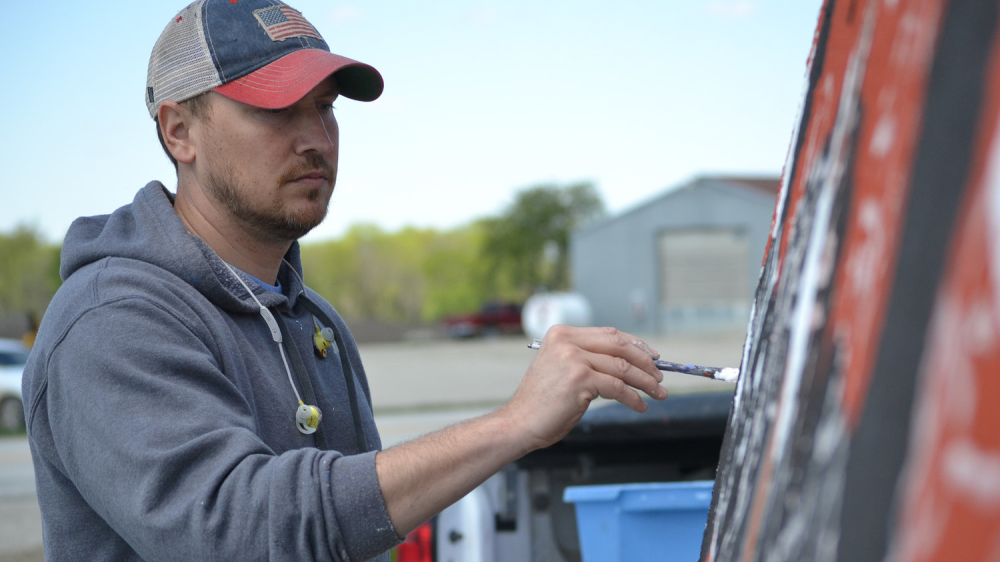
Beyond the original Freedom Rock in Menlo, Sorensen has started a Freedom Rock Tour through Iowa’s 99 counties to honor veterans and promote Iowa tourism. He’s painted unique Freedom Rock murals in 80 counties and will complete the remaining 19 over the next few summers.
Sorensen is not commissioned for the project but is able to complete these murals with the tremendous support of family, friends and donors. He also hopes to paint a Freedom Rock in each of the 50 states. So far, he has painted three in Missouri and two in Minnesota. This summer he’ll complete another in Minnesota and paint his first one in Washington state.
Lunching and Learning
Joel Tharp, a proud Subway franchise owner from West Des Moines, welcomed the Food U group for lunch in his Stuart Subway location.
Known for fresh sub sandwiches, catchy jingles and convenience, Subway restaurants are a cornerstone of rural and urban communities across the globe. The franchise-based business is the largest single-brand restaurant chain in the world.
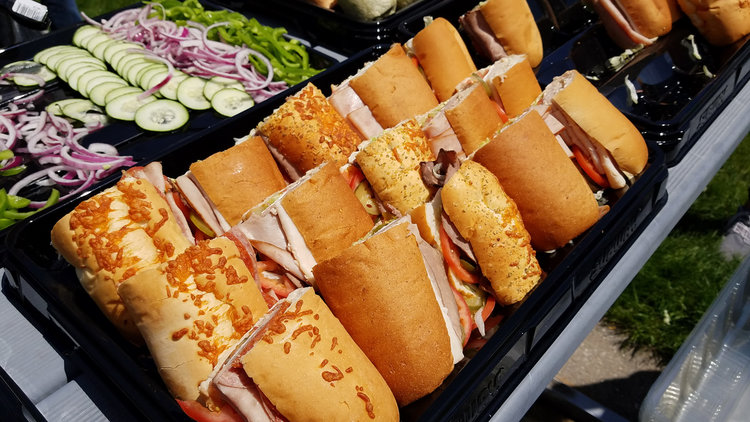 Subway sources turkey from farms located throughout north central and southeast Iowa through farmer-owned West Liberty Foods located in Muscatine County, Tharp explained. West Liberty Foods was formed in 1996 under the guiding principles of the Iowa Turkey Growers Cooperative.
Subway sources turkey from farms located throughout north central and southeast Iowa through farmer-owned West Liberty Foods located in Muscatine County, Tharp explained. West Liberty Foods was formed in 1996 under the guiding principles of the Iowa Turkey Growers Cooperative.
“Our partnership with West Liberty Foods has been tremendous. They now employ 2,400 people and supply meat for nearly two-thirds of the 32,000 stores in the U.S.,” he says. “In 2005, they constructed a state-of-the art meat slicing facility, just for Subway.”
Many other farm-fresh ingredients, including ham featured in breakfast and lunch sandwiches, are also produced by Iowa farmers.
In partnership with his mom, Tharp opened his first store in Newton in 1990. Through the years his father and sister also became involved in the business. Today, he owns 14 Subway restaurants around the state. Tharp attributes much of his success to the welcoming, hardworking and loyal managers and employees at each store. They take great pride in their work and make every guest feel like part of the family.
Rhyme Time with the Rowe Family
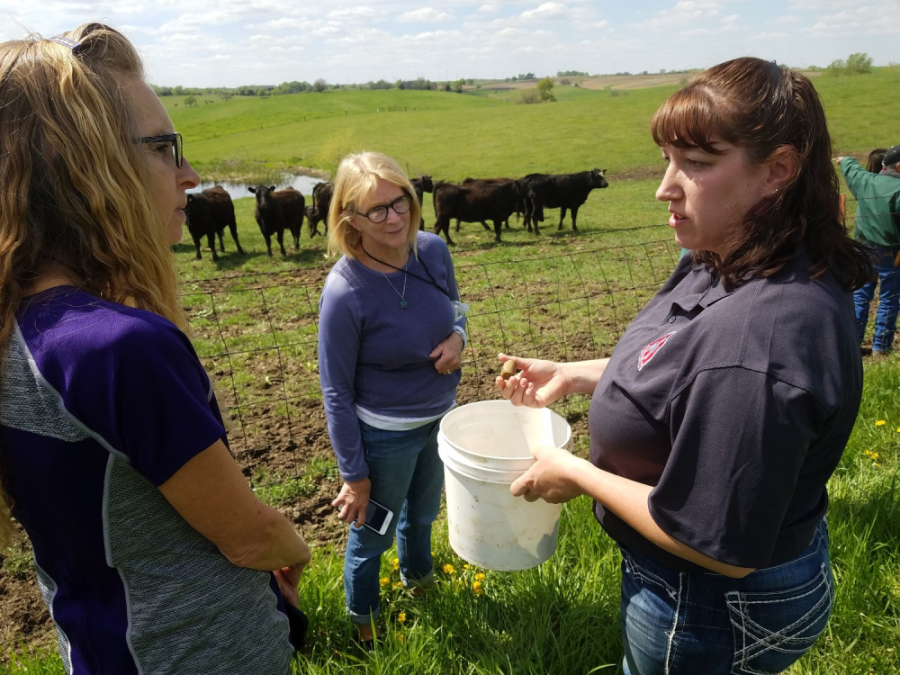 Justin and Corinne Rowe (it rhymes with cow!) run a Red Angus cow-calf farm in Madison and Union counties. With a wet spring wreaking havoc on country roads near Justin and Corinne’s pastures, the tour was moved to Justin’s parents, Glenn and Bev Rowe, who run Rowe Ranch in Lorimor.
Justin and Corinne Rowe (it rhymes with cow!) run a Red Angus cow-calf farm in Madison and Union counties. With a wet spring wreaking havoc on country roads near Justin and Corinne’s pastures, the tour was moved to Justin’s parents, Glenn and Bev Rowe, who run Rowe Ranch in Lorimor.
Together, the family explained their operations and shared goal of improving the land and building a herd of cattle that prospers on their land.
The Rowes use rotational grazing, which allows cattle to graze smaller sections of pastures in shorter time frames to allow the recovery and regrowth of grass between rotations. The family uses solar-powered electric fences to help keep cattle out of ponds and streams and enhance water quality.
Justin’s favorite tool is their four-wheeler. He can transport all his tools and record-keeping necessities through muddy pastures better than a truck. The Rowes keep about 15 years of data on their cattle to help them manage their herds’ genetics.
“After visiting the Rowe farm, I had such a good feeling. They treat their herd like family. They truly care about their animals and it shows,” says Kari Holloway, an Iowa FFP Champion and supply chain manager from Adel.
The Rowes are passionate about sharing their family’s farm story on social media. Throughout the spring and early summer, Corinne has been updating their Rowe’s Red Cows Facebook page with spring calving photos. On a cow-calf farm, cows give birth once a year. The calves will live off their mother’s milk until they are weaned at 6 to 10 months old.
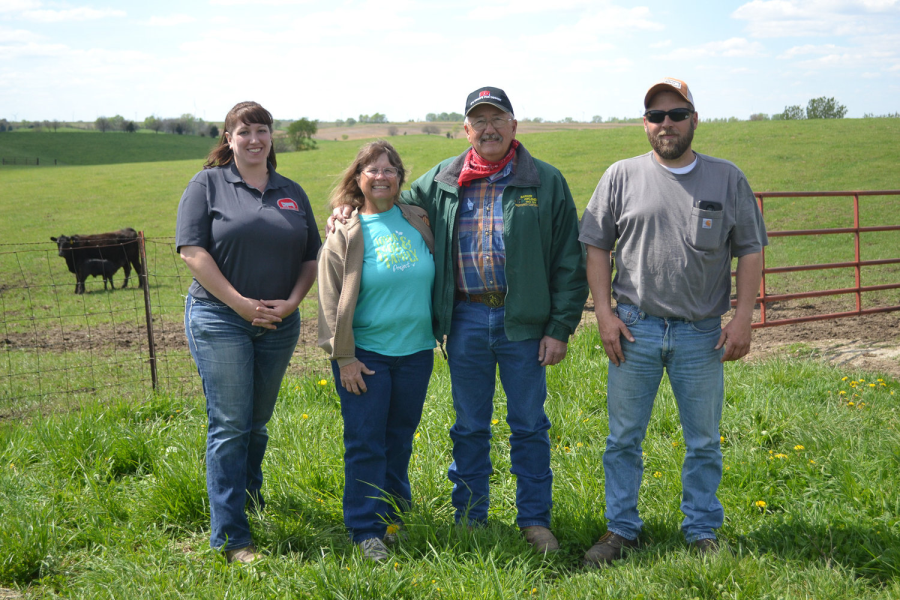
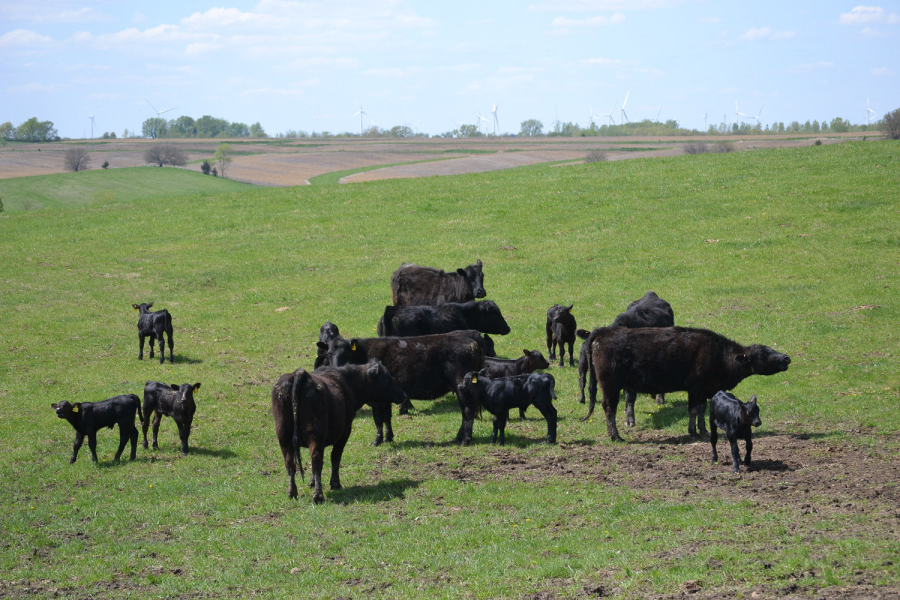
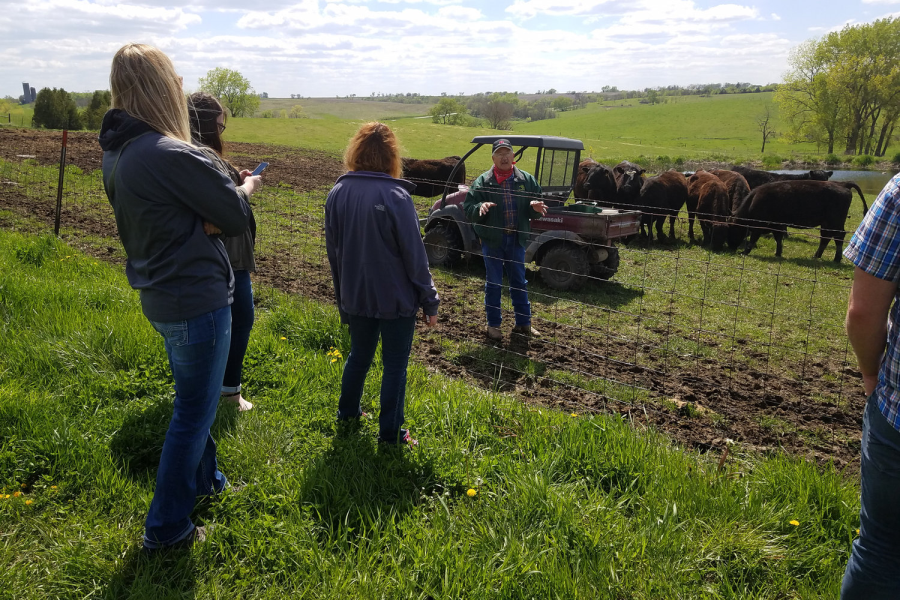
The beef the Rowes raise and sell to supermarkets or restaurants is the same beef they enjoy with their own family, so it’s no surprise they do everything possible to raise livestock with care to produce healthy, high-quality beef.
Beef. It’s What’s For Dinner. Share these fun beef facts around your dinner table:
- Iowa is home to more than 3.9 million cattle and is one of the nine states where cattle outnumber people.
- Beef provides 10 essential nutrients include zinc, iron, protein, and B vitamins.
- Raising beef today requires less water, land and energy and has a smaller environmental footprint thanks to continuous improvements by farmers and ranchers.
- Approximately 85% of U.S. grazing lands are unsuitable for growing crops. Grazing cattle on this land more than doubles the area that can be used to raise food.
Apply to be an Iowa FFP Champion!
Are you interested in attending a future Food U event or furthering your understanding of agriculture? Apply to be a member of the Iowa FFP Champions Program.
Iowa FFP Champions are volunteer participants representing a variety of industries and occupations including healthcare, food banks, administrative services, engineering, communications and education. If you’re selected, you'll be invited to Food U events, get priority access to speaking engagements, participate in surveys and focus groups, and receive a quarterly newsletter.